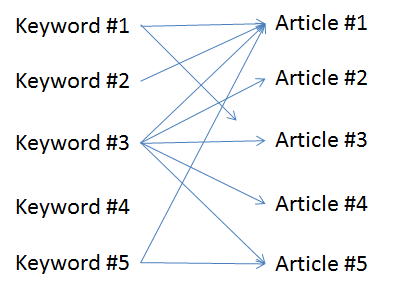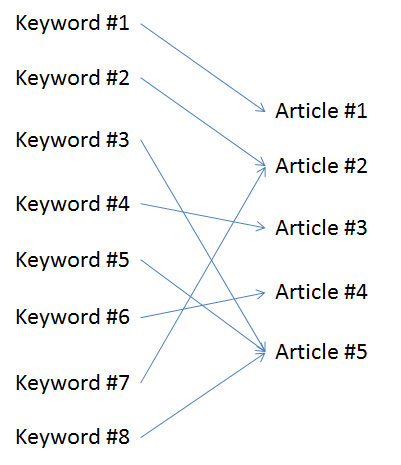Published by Jeremy. Last Updated on July 29, 2020.
Disclaimers: Our site uses demographic data, email opt-ins, display advertising, and affiliate links. Please check out our Terms and Conditions for more information. Listed prices and attraction details may have changed since our visit and initial publication.
When it comes to putting your keyword research into use, you probably think you need to find a high traffic, low competition term, use it internally a number of times per conventional practices, and hope that in a few months time Google will recognize that you should rank for that term.
Sounds simple, right?
Well, you are probably shooting yourself in the foot through misuse of your keyword even if you follow all conventional best practices.
✈️ Book Your Next Trip
- • Planning a trip? Find a flight deal.
- • In need of a room? Check out hotel and apartment prices.
- • Taking a cruise? Find a cruise itinerary for your journey.
- • Don't overlook picking up a rental car or day tours as well!
What You Probably Are Doing for Implementing Your Keyword Research
There is a simple reason for why we think this, and when it comes down to it odds are good your keyword structure looks something like the following:

In the above scenario, you have five keywords. Keyword #1, let’s call it “things to do in Korea,” you are targeting in two articles. Keyword #2, “food in Korea,” is targeted in one article. Keyword #3 is found in five articles. Keyword #4 is not used at all even though you think it is. And Keyword #5 is featured in two.
Now, let’s think like Google’s bot for a minute. Google sees “things to do in Korea” featured prominently in two articles on your site. Which is it going to rank in search results for that term?
You don’t have a good answer for that one, do you?
If you think that it is going to do both you are fooling yourself unless you have an extremely top tier site or are chasing non-competitive keywords. But since you probably do not run Wikipedia, Korea’s tourist office, or Travel and Leisure (and also want to target keywords people actually use), odds are good Google won’t consider ranking either as it does not have clear enough direction on what to do with your content!
This is why we take a more streamlined approach to how we implement our keyword research.
What You Should Be Doing for Implementing Your Keywords
Our approach is a bit different, and it follows a fairly simple philosophy: any given article can rank for multiple keywords, but no keyword should be targeted in more than one article.
A visual approach to this is more like the following. See if you can spot the difference:

Using the above examples, Keyword #1 “things to do in Korea” only points to article #1. It is a highly relevant article for that keyword, and we do not use this term anywhere else on our site except either as text inside article #1 or as a link pointing to article #1. If Google looks at our site and sees “things to do in Korea,” it will only ever be in relation to article #1- and that is what we want.
Article #2, on the other hand, features Keyword #2 “food in Korea” and “Korean restaurants”, Keyword #7 in the image above. This article can rank for more than one term because keywords do not compete with each other. When Google compiles results for the term “food in Korea” and finds references on our site, it is all article #2 all the time. When it does the same for the term “Korean restaurants,” article #2 also fits as a highly relevant result.
You can repeat this logic as much as you like, but at the end of the day as long as any given keyword only points to one article, you are good. But if your article has three, four, or five or more target keywords, well, that is a different story as it ends up looking like you’re keyword stuffing. (We only ever overtly target one keyword per article, but have been known to feature two or three in very select cases. Trust us when we say optimizing around more than one is harder than it sounds!)
- Still confused? Try thinking of it a different way. As content creators we produce content to target keywords, but Google works by using keywords to find relevant content. Is your keyword implementation helping Google in its ability to serve the best content to users, or hindering it? If you don’t make it easy for Google, Google won’t make it easy for you!
As with all things in life, if you make things easier for your target, you’ll benefit in many ways. The Google bot is no different.
A Deeper Dive Into Why We Take This Approach
So why do we know the above happens to be the case? Well, we’ve experienced the negative effect of using the same keyword multiple times over on our local Pittsburgh blog first hand!
We were trying to rank for the highly competitive “things to do in Pittsburgh” term (100,000+ monthly searches), and after having our target article go viral and receive a ton of shares we got lifted to within the first few pages on search results. Awesome.
Cut to a week later when we had a second post go viral, and our target post was replaced with the new post that happened to have the same keyword inside it. What?!
It turns out that Google couldn’t tell the difference on what post to rank, despite the fact that one used the keyword way more often on our site, and it started featuring any post with our “things to do in..” keyword inside it. When we cleaned up one, it would replace it with another simply because the term showed up in the body at some point.
After a few iterations of doing this, we ended up scrubbing the use of the “things to do” term out of all articles of our site except for our target article (and linked keywords in other articles, pointing to our target post, of course). Naturally, our target post was back in the search results and even climbed a few spots for good measure! Later on the rank continued to rise and is now prominently featured on page one- most of the time at least.
Now that we are really aware of this phenomenon, we have noticed its negative impact occurring on sites time and time again.
Bloggers write weekly articles with a target keyword, link to random articles with target keywords, and generally throw out a keyword as much as possible in order to saturate their site and hope it makes them rank from a global perspective. This may work for top tier sites who can rank multiple articles on the first page of Google for a target keyword, but for everyone else (and most all bloggers, sadly), this simply doesn’t work.
You have to be smarter than the bot and only focus one one article for any given term. Keep that in mind when implementing your keyword research!
Pop quiz: Can you tell what term we are targeting for this article? We use it here and nowhere else on our site unless pointing to this article. If we did it right you won’t know it overtly, but if you stop to think about it you’ll find it right away. This is how you implement your keyword research effectively.
Have an existing blog that is in need of an upgrade? Check out the following services we personally use!
- BigScoots - Premium managed hosting with plans as low as $35/month.
- GeneratePress - A customizable theme designed for site speed.
- AdInserter Pro - A widget logic plugin that is quite powerful.
- WP Rocket - An image and caching optimization plug-in.
- Mailerlite - Cost effective newsletter service.
- Keysearch - Keyword research tool for SEO.
- Pretty Links Pro - A great link cloaking tool to clean up affiliate links.
About Jeremy

About the Author: Jeremy is a full-time travel writer based in Pittsburgh and primary author of this site. He has been to 70+ countries on five continents and seeks out new food, adventure activities, and off-the-beaten-path experiences wherever he travels.

What about different blog posts with different but almost similar keywords like “free things to do in xxx”, “affordable things to do in xxx” and “things to do with kids in xxx”?
I think you could likely get away with it, but if you could try and fit them all into one post it may be better. Admittedly I can see both sides as being feasible. In my opinion, the problem with those three is they all contain “things to do in xxx” so you’ll be self-completing in a way. Google should know which to prioritize, but in my experience I’ve ranked for non-priority posts in situations like these, so I always try and operate under the rule of any keyword can only be associated with one post. So in this case, all of my variants of “things to do in xxx” are only associated with one article and not three separate ones. I should test it more though.